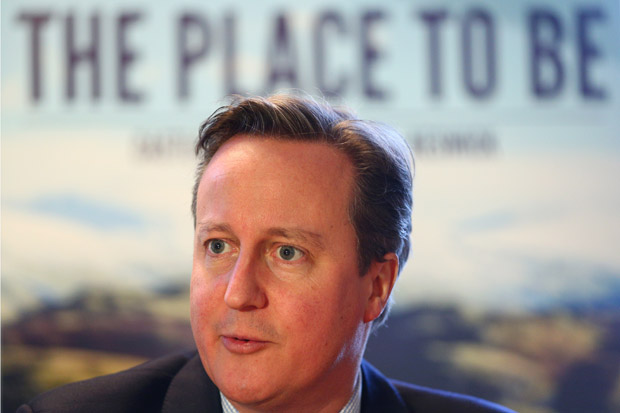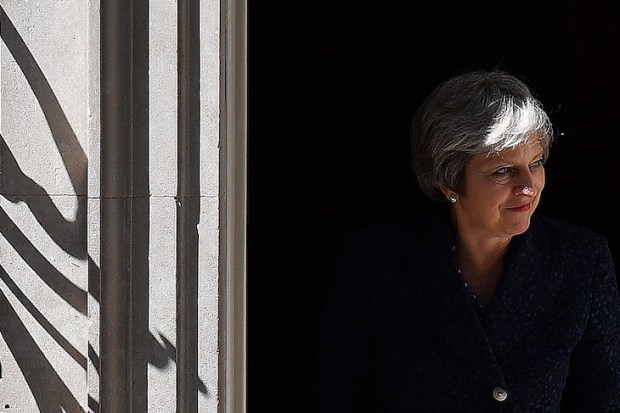Listen
It is normally in the final, frantic days of a campaign that a multitude of dubious claims are made. But when it comes to the EU referendum, this has begun before the date of the vote has even been set.
We’re told that anti-terrorism measures would be damaged by a British exit from the European Union, that migrant camps would sprout up in the garden of England and Six Nations rugby would never be the same again. The strangest claim of all isn’t Sir Charles Powell’s clairvoyant suggestion that Margaret Thatcher would vote to stay in, but David Cameron’s insistence that he would join the EU right now.
The Prime Minister’s position is odd because the ‘in’ side’s strongest arguments focus on the disruption Brexit would cause the UK. It is not clear how quickly terms could be agreed with the EU or how fast Britain could strike trade deals with other countries.
Last Friday, at a dinner in Brussels, Jeppe Tranholm-Mikkelsen, secretary general of the European Council, told me that a British exit could take five to ten years to negotiate and ratify. The terms of Article 50 suggest it would take Britain at least two years to wrestle free. There is even talk that Britain’s departure might need to be approved by -referendums in other countries. This -warning from Tranholm-Mikkelsen, one of EC president Donald Tusk’s most senior officials, is worth noting because he has long been seen as sympathetic to Britain’s concerns.
The ‘out’ campaign would counter that Britain would not invoke Article 50 until it was ready. But senior figures in the Foreign Office believe there is a danger that Article 50 could be invoked by the rest of the EU in the event of an ‘out’ vote regardless of the British government’s -position. One senior government minister warns that exit terms would be imposed upon us ‘without our even being in the room’.
If Britain quit the EU, it would no longer be party to the 53 trade deals that Brussels has negotiated with the rest of the world. Renegotiating would pose logistical problems, especially as the civil service no longer has any trade negotiators. Since 1973, trade became an EU competence. Britain hasn’t struck a solo agreement since.
The United States likes to negotiate its trade agreements consecutively. If Washington adhered to this, Britain would have to wait until talks on the Trans-Pacific Partnership and the Transatlantic Trade and Investment partnership had been settled before any deal could be done.
Would the United States make an exception for the UK, which remained one of its most important military and strategic allies? One figure involved in the ‘out’ campaign suggests Britain could sign a carbon copy of every trade agreement the EU currently has. It is, however, hard to dispute that for the first few years following a British exit from the European Union we’d be in choppy waters.
But this is not the argument David Cameron is making. Instead, he tries to sell the merits of his proposed deal with the EU and the sovereignty law that Oliver Letwin is trying to fashion. The extra assurance on sovereignty was meant to help bind both Boris Johnson and Michael Gove to the ‘in’ camp. Actually, it risks making it more difficult for either to support the Prime Minister’s position.
Martin Howe, the respected QC who Cameron appointed to the Commission on a Bill of Rights in the last parliament, has already explained that this sovereignty law would be essentially meaningless because parliament is sovereign now. But if Parliament passed a law that contradicted EU law, the European Court of Justice would find that Britain was in breach of the treaties and issue a fine. Britain would then have to choose between backing down or leaving the European Union.
Howe does not think a German-style constitutional court, which Cameron has said he is keen on, would solve the sovereignty problem either. Unlike most countries, Britain has no written constitution. It is hard to dismiss Howe’s views, since he is one of the lawyers the government has consulted to try to thread its legal needle.
Cameron seems determined to sell -Britain’s EU membership as guaranteeing our national security. This week, he warned that anti-terror cooperation would be weakened if Britain were no longer a member. It’s hard to see why, given that it is clearly in the -interests of all the countries involved.
The EU might very well be angry if -Britain voted to leave, and might want to ensure our exit would be neither quick nor painless. But no EU country — and particularly not France, which was the victim of six successful terrorist attacks last year — would opt to abandon arrangements that might help prevent future atrocities.
The security argument does not sit well with the fact that the European Court of Justice, the European Union’s highest court, is blocking the extradition of Abu Hamza’s daughter-in-law. She is a Moroccan -national, and was convicted of attempting to smuggle a mobile phone Sim card into -Belmarsh, Britain’s highest-security prison. The continued presence of such people is hardly conducive to our national security, yet it is forced on us — against the will of the British government
In the debate over the EU, Cameron wants to cast himself as a pragmatist. He presents himself as a man who has conducted a dispassionate analysis and decided it is, on balance, worth staying in. He argues that the benefits we’d accrue from leaving are not worth the turmoil and uncertainty that Brexit would involve. But when he suggests that he would choose to join the EU even if Britain were not already a member, he undercuts his own most powerful argument.
Got something to add? Join the discussion and comment below.
Get 10 issues for just $10
Subscribe to The Spectator Australia today for the next 10 magazine issues, plus full online access, for just $10.
You might disagree with half of it, but you’ll enjoy reading all of it. Try your first month for free, then just $2 a week for the remainder of your first year.















Comments
Don't miss out
Join the conversation with other Spectator Australia readers. Subscribe to leave a comment.
SUBSCRIBEAlready a subscriber? Log in